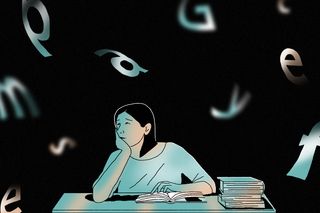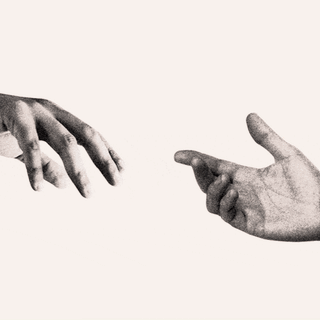
What It’s Like To Live With: Dyslexia
“[Working with Excel sheets] was really difficult for me, and my colleagues used to react by saying things like, ‘Are you blind?'”

What It’s Like to Live With explores the stories of people who see and experience every day a little differently.
Trigger Warning: The article below mentions bullying.
I’m 21 now, and I was professionally diagnosed with dyslexia, dysgraphia, and dyscalculia when I was in eighth grade. My mother was able to diagnose it earlier by observing me, though — she is a teacher and is generally well-informed. But she didn’t want my learning disability to shape who I was. Especially since peers, relatives, and just society, in general, tend to look at you differently once they learn you’re disabled; there are obviously a lot of stigmas to deal with. So, my mother decided to hold off on a professional evaluation until I absolutely needed it.
I, for one, am glad she waited; it allowed me to form some semblance of my identity without letting the stigma affect me as much as it could have. I’m more accepting of who I am because of that.
Until my professional diagnosis came in, though, it’s not like I didn’t have help. I had access to early interventions through my mother, and that’s probably why the impact of dyslexia in my everyday life now is “low.” She looked into the right ways to assist me in my education and started tutoring me accordingly. She was very patient with me, too. Even though I made mistakes while reading, writing, and calculating, she wouldn’t make me feel bad about it — she would calmly help me learn. I remember we used to play this game, where she would pronounce every word very slowly. I think, in the process, my ability to think creatively got a boost.
What prompted the [professional] evaluation was the fact that I was struggling with my courses a lot by the time I went to eighth grade; I had failed a couple of subjects too. To make matters worse, I was being bullied — not just by my peers, but by my teachers too. Things got really hard to manage.
I’m glad I got diagnosed, but sitting in the hospital for hours and getting through different tests was a lot for me to deal with — especially as a neurodivergent child with cerebral palsy.
Related on The Swaddle:
Why Disability Activists Argue Against Labels Like ‘Differently Abled’
After I got the diagnosis, people looking down on me was one thing. I also had to go for remedial classes and occupational therapy, and it wasn’t a good experience. I went for just one day and then discontinued after getting really uncomfortable with the lack of empathy among the special educators. I remember them being really impatient, and even shouting at me. Basically, they weren’t well-trained and didn’t know how to deal with people living with learning disabilities, or any kind of disability, honestly.
What also bothers me about the education system is that people with disabilities, who might need extra time to write their exams, are seated in a separate room away from everyone else. This categorization acts like a constant reminder that you’re different from everyone else; it ends up putting a label on you.
The practice of seating us in separate classrooms continued in college too. There, the teachers on invigilation duty would keep prompting us to write faster even — it was so evident that they just wanted to hurry home, and had little to no training or experience in handling students with disabilities.
Also, at school, I didn’t want to disclose my disability to my peers. So, during exams, they would ask me why I’m heading elsewhere and not sitting with them. I’d have to come up with excuses — like, “I’m not feeling well, so I’m going to sit in another room.” But how many times can you keep making excuses? When I had started college, I decided there was no point in hiding my disabilities any longer. So, in my psychology class, I decided to disclose my learning disabilities. Unfortunately, it resulted in people looking at me like announcing my disabilities was akin to committing a crime.
Related on The Swaddle:
Study Peeks Into the Brain Wiring Behind Dyslexia
Most workplaces are no different either. I was working at a media company previously, where we had to input data into Excel sheets on an everyday basis and work on very short timelines. Obviously, it was really difficult for me, and my colleagues used to react by saying things like, “Are you blind?” or, “Have you even passed tenth grade?” It got really toxic and I leave my job and my dream of working in the entertainment industry.
The thing is: I don’t want people to sympathize with me. I need people to see that there’s nothing tragic about being different — that living with disabilities is my “normal.” I’m looking for empathy.
Now, I work at an international company called BackPac as a diversity inclusion analyst. My work still involves a lot of research — and, therefore, reading — but people are much more accepting here. Instead of berating me for making mistakes, sometimes they simply ask me if I can re-do a piece of work. And that kind of supportive environment, where I’m not constantly made to feel “less than,” really helps, you know?
Ultimately, it is the support and empathy I received from my family and friends — and now from people at my workplace — that pushes me to fulfill my purpose of building a place, where neurodivergent people and people with disabilities, feel accepted.
This interview has been condensed and edited for clarity. As told to Devrupa Rakshit by Aashna Parikh.
Devrupa Rakshit is an Associate Editor at The Swaddle. She is a lawyer by education, a poet by accident, a painter by shaukh, and autistic by birth. You can find her on Instagram @devruparakshit.
Related


How Some People in Abusive Relationships Found Comfort, Freedom Through Infidelity
